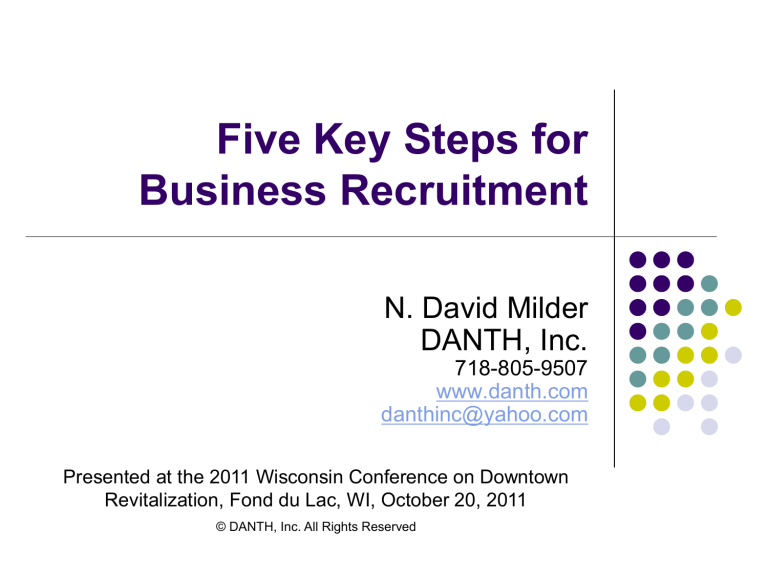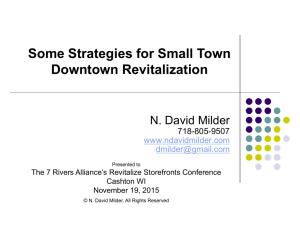Milder - Wisconsin Downtown Action Council

Five Key Steps for
Business Recruitment
N. David Milder
DANTH, Inc.
718-805-9507 www.danth.com
danthinc@yahoo.com
Presented at the 2011 Wisconsin Conference on Downtown
Revitalization, Fond du Lac, WI, October 20, 2011
© DANTH, Inc. All Rights Reserved
This presentation is based on my book
Downtown Business Recruitment.
You can download it (in a pdf format) at no cost at www.danth.com
.
N. David Milder, DANTH, Inc.
2
My Five Key Steps
1.
2.
3.
4.
5.
You (the downtown manager or staff person doing the recruiting) are there to make a difference, not to be an inexperienced broker trying to fill vacancies
You need a strategy to make a difference and keep your recruitment efforts from being shotgun, wasteful of scarce resources and ineffective
The starting place is with landlords and the spaces they have for leasing -- without them you have no product to pitch
Make your municipality’s approvals and permissions process easy and affordable for tenant prospects large and small
Make recruitment marketing materials -- e.g., the "package", CDs, websites, brochures, etc. – effective by matching them with achievable objectives and how people will use them
N. David Milder, DANTH, Inc.
3
1.
Know your role: The downtown business recruiter is there to make a difference!!!
Normal market forces and actors are not working or your organization’s involvement would not be needed
Most likely you are on the staff of a downtown organization
But, you are not a landlord, commercial broker or developer… and you should not try to act as if you have their skills
Nor are you there to fill any or all vacancies with subpar tenants for lazy landlords. Normal market forces can eventually do that
You are there to help bring the normal market forces/actors back into play and to help bring in the best firms that it is economically feasible to attract.
N. David Milder, DANTH, Inc.
4
Your role
cont’d 2
That means dealing with “table setting” problems
such as:
Infrastructure – e.g., sidewalks, sewers, parking facilities, mass transit facilities, great public spaces
Crime – dealing with fear of crime is the primary challenge
Appearance – improving building facades, building design standards, etc.
The sizes and condition of your available spaces, etc.
Permissions and approvals process
It also means a very strong effort to network and build
relationships with able landlords, brokers, developers
Look for savvy commercial brokers – in other communities, if necessary. They usually will travel if the opportunities or “incentives” are sufficient
Talk to other downtown managers
Leverage savvy local landlords – they often have a relationship with savvy brokers
Follow regional real estate publications
Go to regional meetings of the ICSC
To do this successfully, you must be prepared to talk about a concrete project or leasing opportunity
N. David Milder, DANTH, Inc.
5
Your role
cont’d 3
These tasks probably mesh better with your skill sets
You are also there to help identify independent retail tenant prospects
Brokers and developers often find this very expensive to do.
--It is actually more difficult and more expensive to recruit quality independents than national chains. The latter know their space requirements and have professionals on staff or under contract
--More and more developers are asking downtown organizations to help them recruit quality independents
Helps assure adherence to the revitalization strategy .
-- You know your strategy, they don’t
-- Ultimately, even cooperative brokers and landlords must look to getting a signed lease. You need to make sure they have strategy compatible tenant prospects to target early in their search for potential tenants.
N. David Milder, DANTH, Inc.
6
2. You need a strategy to keep your recruitment efforts from being shotgun, wasteful of scarce resources and ineffective
A pivotal question is “how does one identify the best tenant prospects?”
The first and essential step is a market-driven downtown economic revitalization strategy that identifies the niches to target and is developed using solid data and sound analysis.
This type of strategy helps assure that a downtown recruitment program can make a difference.
Without such a strategy to guide it, a business recruitment program will be far less effective and efficient than it could be
-- and possibly capricious, political, or imitative
N. David Milder, DANTH, Inc.
7
You need a strategy
cont’d 2: Niche
Strategies
Niche strategies are particularly well-suited to downtown and
Main Street districts
A downtown niche with many attractive shops can serve as a specialized shopping center, capable of providing the consumer with a large choice of merchandise and price within its specialized product area.
A niche strategy can be used to make downtown retailers far more competitive by banding together in joint advertising and promotional campaigns
Niches can also be used as an effective business recruitment tool. As real estate brokers are fond of saying, “retailers are like sheep” and the existence of a niche demonstrates a proven level of customer traffic and expenditures.
N. David Milder, DANTH, Inc.
8
You need a strategy
cont’d 3. Why More
Districts Do Not Have a Strategy?
A frequently offered explanation is the lack of sufficient funds, but workable strategies and action plans for small downtowns can be done for around
$10,000. The real reasons for not having a strategy too often are:
The downtown organization’s leaders do not understand its importance or appreciate its usefulness. In part, this is due to the fact, that such “products” as managerial focus, direction, insight, efficiency and effectiveness are not as visible and tangible as a sidewalk sale, a newsletter, a brochure, a street cleaning machine, Christmas lights, etc., that can be shown as achievements to the organization’s membership
The vast majority of their members do not have a business plan or strategy for their own firms; many are even unfamiliar with them conceptually. If planning and strategic functions are not salient to the members at that basic level, it is unlikely that they will understand why the downtown organization needs or wants them
Consequently, strategy development is given a low priority within the downtown organization -- especially when it comes to allocating scarce discretionary operational funds.
N. David Milder, DANTH, Inc.
9
3. The starting place is with landlords and the spaces they have for leasing
Retail locators and independent business prospects are not interested in wonderful downtowns – they are looking for attractive and affordable spaces in great downtowns
Conventional wisdom erroneously says that finding good tenants is the toughest part of business recruitment
In fact, the toughest parts are having attractive commercial spaces to pitch and the cooperation and participation of the landlords that own/manage them
A successful business recruitment program is impossible without the attractive available spaces and cooperative landlords!!!
N. David Milder, DANTH, Inc.
10
Landlords
cont’d 2: cultivating cooperative relationships
Be strategic in selecting landlords to work with
Target landlords you already have working relationships with:
Landlords on the board of directors of the downtown organization who have attractive commercial spaces
Landlords who have benefited from and liked other programs and services provided by the downtown organization such as security, street sanitation, façade improvements, consumer marketing and promotions, etc.
Use leadership modeling to spread cooperation
Select other landlords based on the location, size and condition of the retail sites they own or control
‘Snowbirds” are no excuse for inaction!
Is it worth a $1,000 or even $2,000 visit to get an absentee landlord of a strategically important property on board? Absolutely yes
!
N. David Milder, DANTH, Inc.
11
Landlords
cont’d 3: some things a recruitment program can offer that might make it easier for professional landlords to sign quality tenants:
Providing a strong and effective marketing campaign focusing on the advantages of the downtown as a business location
Supplementing their contacts with strong commercial brokers
Supplementing their direct contacts with desirable independent tenant prospects
Helping their tenants get through the municipality’s permissions and approvals process
Providing linkages to public sector programs offering financial incentives.
N. David Milder, DANTH, Inc.
12
Landlords
cont’d 4: some things a recruitment program can offer that might make it easier for small unprofessional landlords to sign quality tenants:
Provide accurate information on market-rate rents, nearby tenant mixes and competitive spaces
Introduce them to relevant tenant prospects who come to the downtown organization looking for commercial spaces
Provide them with marketing materials that sell the whole downtown as a business location, thus enabling these landlords to make a better pitch to tenant prospects
List their available spaces on the downtown organization
’s website at little or no cost.
Prepare a marketing package and pitching their spaces to the people networked with the downtown organization ’s recruitment program who make decisions about leasing or buying retail and office spaces
Help their tenants get through the municipality
’s permissions and approvals process
Provide linkages to any relevant public sector programs offering financial incentives and helping them with the paperwork.
Provide information about the types of quality tenants other landlords are signing.
N. David Milder, DANTH, Inc.
13
4.
Make your municipality’s approvals and permissions process easy and affordable for tenant prospects large and small
Why?
An approvals gauntlet has become an increasingly important negative factor in business locational decisions
In several parts of the country municipalities are competing to have the fastest and most efficient approvals processes so they can have a better chance of recruiting quality businesses
For small merchants, their lack of knowledge, experience and relevant professional staff combined with the costs, time, insecurities and political fears associated with getting the needed permits can diminish their desire to locate in a district
Even developers (e.g.., those in Peoria, AZ) are complaining that such approvals gauntlets severely impedes their ability to sign quality independent merchants as tenants
Some towns get a reputation for being really tough on permissions and approvals and it take decades for them to recover from it
N. David Milder, DANTH, Inc.
14
Approvals and permissions
cont’d 2;
What is needed
A speedy process is needed by all: a few weeks, not months should be the goal.
Greedy fees may be affordable for big firms, but not small independents – and they will be strongly disliked by both
Small independents will need help navigating the process.
Downtown organizations can help by:
Providing a list of the permits and approvals that will be needed
Providing info about where to go for them
Accompanying the merchant to key meetings
Generally, providing advice on how to proceed and deal with any difficulties
Getting the local government to agree to have a private sector panel review its approvals and permissions process every few years and make recommendations for improvements
N. David Milder, DANTH, Inc.
15
5. Make recruitment marketing materials -- e.g., the
"package", CDs, websites, brochures, etc. – effective by matching them with how they will be consumed and achievable objectives
As a group, marketing communications tools can be used to achieve a variety of objectives. Among them are:
Piquing the interest of developers, savvy commercial brokers and tenant prospects in your downtown’s real estate opportunities
Establishing or expanding a positive image of your downtown
Reinforcing an existing interest in your downtown, while expanding the person’s knowledge about it
Supporting deal-making by providing critical information about opportunities, sites, markets, infrastructure, incentives, etc.
N. David Milder, DANTH, Inc.
16
Recruitment marketing materials
cont’d
2: The Effort Level Required of the Recipient
A Xerox of a newspaper article may be a page or two long, can be easily carried around in a jacket pocket or handbag and read in a few minutes, even while “on the run”
A handsome, expensively produced pocket folder jammed full of various materials will be harder to carry around and take much longer for all of the materials to be read
An expensively produced DVD about your downtown will probably take 5 to 20 minutes of the viewer ’s time and require easy access to a DVD reader and screen
A PowerPoint or Flash presentation will probably take 10 to 20 minutes; require a computer with the relevant program installed
A 50 to100-page expensively produced, glossy publication about the wonders of your downtown may look great, but weigh a ton and take an hour or two to read
N. David Milder, DANTH, Inc.
17
Recruitment marketing materials
cont’d
3: matching consumer effort, tools and objectives
A good general rule: the amount of time and effort a business person is likely to spend on your marketing tools is proportionate to their existing interest in your downtown‘s business opportunities.
For example, someone who does not know or care much about your downtown is not likely to spend an hour reading about it or even put up with 15 minutes of watching a snazzy Flash presentation on a CD-ROM that celebrates its marvels
Conversely, a retailer who is very interested in locating in your downtown will probably want all sorts of information about available properties, zoning, traffic, parking, consumer markets, investment incentives, etc., and be prepared to spend many hours, if not days, going through it.
First match your marketing objectives with the proper communications tools
Then match those tools with the amount of effort your target audience is likely to expend on reading, listening or viewing your messages.
N. David Milder, DANTH, Inc.
18
Recruitment marketing materials
cont’d
4: Some Words to the Wise
Most important things to have in a recruitment package or website:
A one-page sell sheet on the property being offered
A one-page cover letter that is a de facto opportunity statement explaining why your district is such a great place to invest in
A map or list that shows the other important businesses and customer magnets that are in your district (remember retailers are like sheep)
Cold calls, packages or messages are usually dead on arrival
Personal networking is far more productive than info sent through snail mail, websites, email, express packages, etc.
Good recruiters shrug off rejection …and they get a lot of it!
N. David Milder, DANTH, Inc.
19




